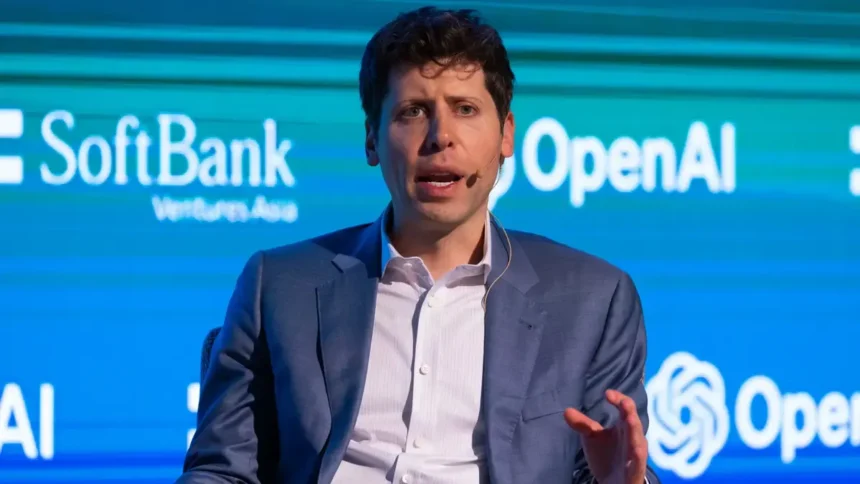OpenAI CEO, Sam Altman’s ambitious $6.4 billion acquisition of Jony Ive’s hardware startup, io, is drawing comparisons to the kind of audacious, future-facing bets made by Meta’s Mark Zuckerberg during the formative years of Facebook.
The deal, conducted entirely in stock, marks the largest acquisition in OpenAI’s decade-long history and signals Altman’s intent to expand the company’s influence beyond software and into consumer-facing AI devices.
Altman announced the acquisition on Wednesday with a nine-minute video posted on X featuring Jony Ive.
He praised the legendary designer, calling him “the greatest designer in the world.”
Ive, renowned for his iconic work on Apple’s iPhone, iPad, and iPod, co-founded io with the intention of reimagining hardware for the AI era. Now, that mission will be folded into OpenAI’s broader vision.
Though io has operated largely in stealth, the size of the acquisition—especially amid a sluggish IPO and M&A landscape—makes it particularly noteworthy.
The $6.4 billion valuation represents just over 2% of OpenAI’s estimated $300 billion paper valuation, set during a recent SoftBank-led funding round.
For many observers, the deal echoes a now-legendary moment in tech history: Zuckerberg’s $1 billion acquisition of Instagram in 2012, just weeks before Facebook’s IPO.
At the time, Instagram was a 13-person startup with no revenue but significant user traction. Zuckerberg explained the move by saying Facebook aimed to “learn from Instagram’s experience to build similar features into our other products.
“This is an important milestone for Facebook because it’s the first time we’ve ever acquired a product and company with so many users. We don’t plan on doing many more of these, if any at all.”
That bold move paid off. Less than two years later, Facebook acquired WhatsApp for $19 billion, a company with $15 million in revenue and over 450 million monthly active users. The app has since grown to over 3 billion users.
During Meta’s first-quarter earnings call in April, Zuckerberg confirmed WhatsApp’s scale as part of Meta’s Family of Apps, which generated $41.9 billion in revenue that quarter alone.
These acquisitions eventually drew regulatory scrutiny. The Federal Trade Commission alleged that Meta’s dominance in social media was bolstered unfairly by its acquisitions of Instagram and WhatsApp—accusations Meta disputes.
The ongoing antitrust trial challenges the legitimacy of those deals in the context of competitive harm.
Zuckerberg also made a hardware-centric gamble in 2014, acquiring Oculus VR for $2 billion before the company had shipped a consumer device.
Oculus evolved into Meta Quest and now forms the hardware foundation for Reality Labs, Meta’s metaverse-focused division. Despite generating minimal revenue, Zuckerberg remains committed.
On Meta’s latest earnings call, he noted, “AI glasses have really taken off,” and emphasized Meta’s intent to scale distribution.
OpenAI’s acquisition of io may follow a similar arc—uncertain immediate returns, but strategic positioning for long-term dominance.
Unlike Zuckerberg’s early acquisitions, Altman’s play isn’t entirely about users or growth metrics. It’s about the convergence of AI and device design—and the belief that the future of computing will be defined by this intersection.
Interestingly, while io joins OpenAI, Ive’s design collective LoveFrom will remain independent, continuing its work with clients like Airbnb and Ferrari.
However, Altman and Ive said in a blog post that io will now “work more intimately with the research, engineering and product teams in San Francisco.” They described io’s mission as developing products that “inspire, power and enable.”
Zuckerberg’s acquisition strategy helped propel Meta
to a $1.6 trillion market cap, a 15-fold increase from Facebook’s IPO valuation.
Altman, who transformed OpenAI from a non-profit AI lab into one of the most valuable private companies in the world, is now taking a similar leap—with Jony Ive at his side.
“Excited to try to create a new generation of AI-powered computers,” Altman wrote on X.
Whether this turns out to be Altman’s Instagram or Oculus moment remains to be seen—but it clearly marks a pivotal chapter in OpenAI’s evolution from software innovator to consumer-tech powerhouse.
(CNBC)
ALSO READ TOP STORIES FROM NIGERIAN TRIBUNE
WATCH TOP VIDEOS FROM NIGERIAN TRIBUNE TV
- Let’s Talk About SELF-AWARENESS
- Is Your Confidence Mistaken for Pride? Let’s talk about it
- Is Etiquette About Perfection…Or Just Not Being Rude?
- Top Psychologist Reveal 3 Signs You’re Struggling With Imposter Syndrome
- Do You Pick Up Work-Related Calls at Midnight or Never? Let’s Talk About Boundaries







